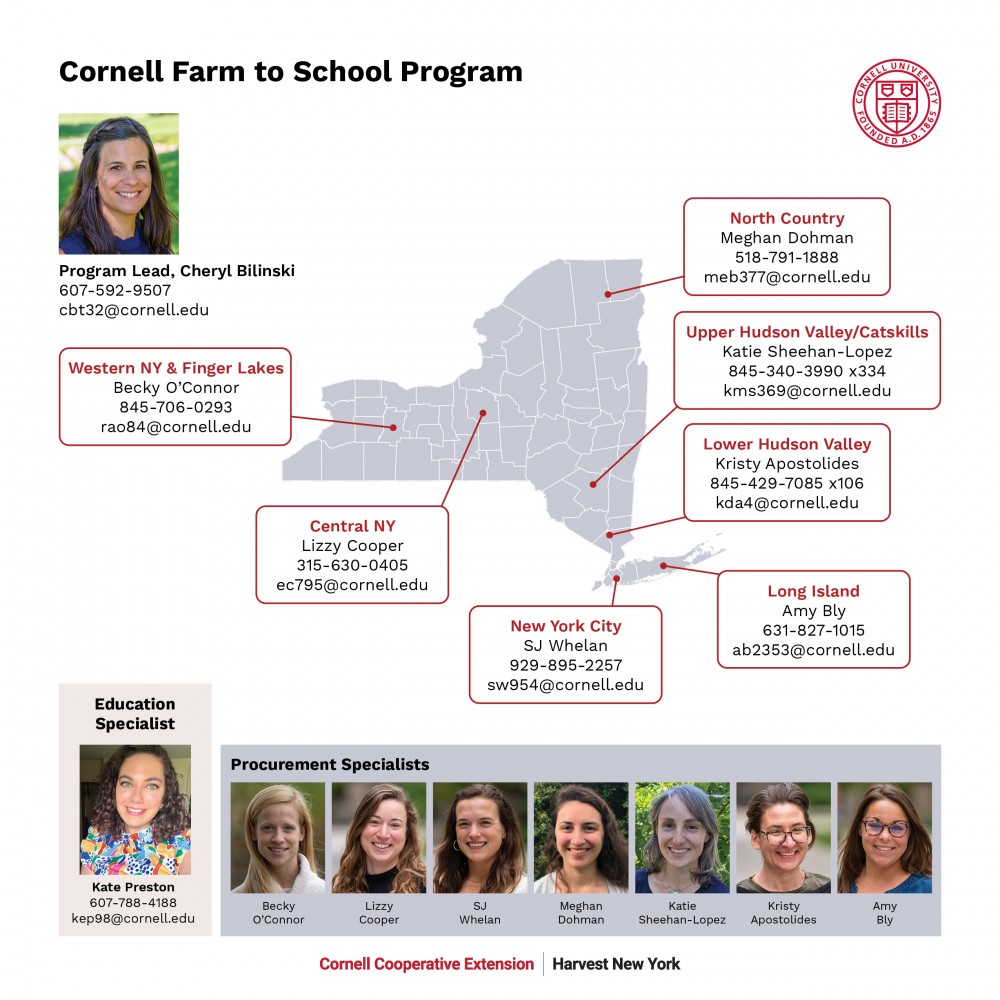Cornell Farm to School Program
Becky O'Connor, Farm to School Coordinator, WNY & Finger Lakes
Harvest New York
The Cornell Farm to School Program provides comprehensive support to Farm to School stakeholders, including School Food Authorities, farmers, distributors, manufacturers, processors, and food hubs. The primary goal of the program is to increase the volume and variety of local farm products purchased by SFAs for use in child nutrition programs.
To achieve this goal, Harvest NY developed a plan of work centered on the following three objectives:
- Provide direct support to supply chain partners.
- Provide statewide support via resource development, training, and technical assistance to supply chain partners.
- Strengthen campus-to-community connections by identifying and developing opportunities for applied Farm to School research.
What we do:
- Find local food and farm partners
- Work with supply chain partners on logistics, including delivery
- Develop local food procurement plans
- Assist with bid development that favors local foods
- Establish Farm to School promotional campaigns, like NY Thursdays and Harvest NY
- Assist with securing grants to expand Farm to School programming
- Support 30% NY Initiative tracking and documentation requirements

The Cornell Farm to School Program includes 7 Regional Procurement Specialists, an Education Specialist, and a Program Lead:
Statewide Program Lead | Cheryl Bilinski: cbt32@cornell.edu | (607) 592-9507
The counties listed under each Regional Coordinator are loose boundaries. If you'd like assistance and fall outside the stated counties, please reach out to Cheryl for assistance.
Education Specialist | Kate Preston: kep98@cornell.edu | (607) 788-4188
Kate works to strengthen Farm to School collaborations among cafeterias, classrooms, and communities.
Lower Hudson Valley | Putnam, Rockland, Orange, and Westchester Counties
Kristy Apostolides: kda4@cornell.edu | (845) 429-7085, ext. 106
Upper Hudson Valley | Sullivan, Ulster, Dutchess, Columbia, Greene, Rensselaer, and Delaware Counties
Katie Sheehan-Lopez: kms369@cornell.edu | (845) 340-3990, ext. 334
Western NY | Erie, Chautauqua, Allegany, Genesee, Wyoming, Orleans, Livingston, Monroe, Ontario, and Yates Counties
Becky O'Connor: rao84@cornell.edu | (845) 706-0293
Long Island | Suffolk and Nassau Counties
Amy Bly: ab2353@cornell.edu | (631) 827-1015
Central NY | Oswego, Onondaga, Cayuga, Oneida, Herkimer, Madison, Cortland, and Tompkins Counties
Lizzy Cooper: ec795@cornell.edu | (315) 630-0405
North Country | Franklin, Clinton, Essex, Lewis, Jefferson, and St Lawrence Counties
Meghan Dohman: meb377@cornell.edu | (518) 791-1888
New York City | SJ Whelan: sw954@cornell.edu | (929) 895-2257
Cornell Farm to School Program Map (jpg; 1839KB)
Upcoming Events
Urban Ag Food Safety Webinar
March 11, 2026
12:00 pm - 1:30 pm
Urban and small-scale producers are encouraged to join us for the Urban Ag Food Safety webinar, featuring speakers from Cornell Cooperative Extension and Cornell IPM. We will explore the 'why' behind food safety, providing a basic overview and diving into specific urban ag considerations including water, pest, rodent, and soil health challenges. We will touch on the regulation and marketing landscape, and share resources for learning more. Bring your questions!Companion Planting in the Garden -- With Mushrooms!
March 12, 2026
10:00 am - 11:30 am
Learn how to diversify your garden harvest with companion planting at this virtual workshop. Plan next spring's garden with guidance CCE Harvest NY Urban Agriculture Specialist Yolanda Gonzalez on growing three different types of mushrooms.2026 Rochester Urban Agriculture Conference
March 21, 2026
9:00 am - 4:00 pm
Rochester, NY
Join us for our annual Rochester Urban Agriculture Conference, a day of learning and connections featuring interactive workshops, community knowledge sharing, Fruition's Gift of Seed Experience, horticulture tables and displays, and more!Announcements
Community Gardens Soil Testing Program Accepting Applications
Soil testing supports the growth and expansion of community gardens by protecting the health and safety of the food produced in these gardens. CCE Harvest NY, in partnership with the NYS Department of Agriculture & Markets (AGM) and the Cornell Soil Health Lab, is offering eligible, food-producing gardens in New York State the opportunity to send soil samples for testing without charge.The soil test will analyze samples for heavy metals and nutrient levels. Test results help gardeners make appropriate plans to produce high quality fruits, vegetables, and flowers. Technical support and education for participating growers will be available from the CCE Harvest New York team. Learn more about the 2026 Community Gardens Soil Testing Program.
2025 Year in Review
2025 was another year of growth and accomplishment for CCE Harvest NY! Our 2025 Year in Review highlights our impacts and details our work.- Farm to School Local Procurement by the Numbers
- Biochar in the NYC Urban Agriculture Landscape
- Harvest New York Supports Farmer-Led Research Advancing Upland Rice Production in New York State
- Community Garden Soil Testing Program Yields Great Results
- Regional Roots: Culinary Training to Enhance School Meals with Local Foods
- Rooted in Learning: Strengthening Farm to School Connections Across New York
- South Lawn Farm Expands Fresh Food Access and Urban Farming Opportunities
- NYS Summit Advances the Mushroom Industry
- Research to Manage Pests in Blueberries with Less Sprays
- Building a Research and Extension Hub at Brooklyn Botanic Garden
- A Successful Community Garden Leadership Program Pilot
- Farm to School Events Deliver Education, Culinary Training, and Business to Business Opportunities
- A Trusted Source of Science-Based Information for the Cannabis sativa Hemp Industry
- Sustainable Pest Management for New York Urban Farmers
- Cultivating Resilience: Harvest New York Drives the State's Climate Goals Through Research and Outreach
- Expanding Agritourism Outreach Across New York State
- Coordinating City Agencies, Academia, and Community Gardens to Improve Urban Soils
- USDA Urban Agriculture Training Development Complete
